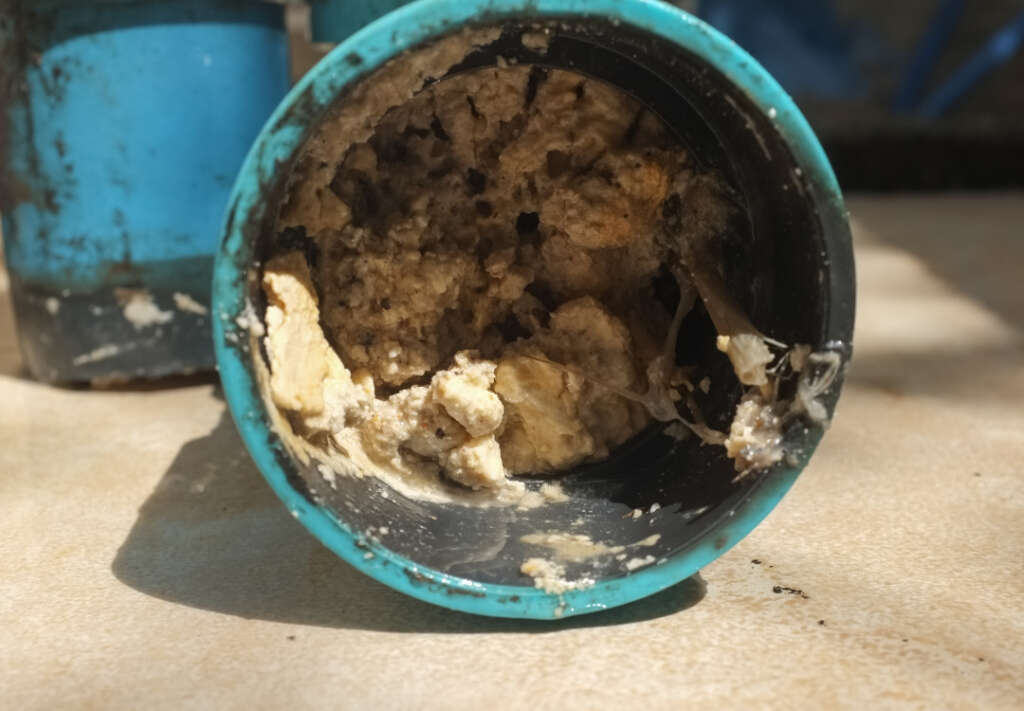Source Control
Wastewater System Prohibited Discharges:
The following types of waters/wastes are prohibited in the CBJ wastewater system, outlined in CBJ Code 75.02.090 – Prohibited Discharges:
- Any liquid or vapor having a temperature higher than 200 degrees Fahrenheit;
- Any water or waste which may contain more than 50 parts per million, by weight, of fat, oil
or grease; - Any gasoline, benzene, naphtha, fuel oil or other flammable or explosive liquid, solid or
gas; - Any garbage that has not been properly shredded;
- Any ashes, cinders, sand, mud, straw, shavings, metal, glass, rags, feathers, tar, plastics, wood, paunch manure or any other solid or viscous substance capable of causing obstructions to the flow in sewers or other interference with the proper operation of the sewage works;
- Any waters or wastes having a pH lower than 4.0 or higher than 12.0 or having any other corrosive property capable of causing damage or hazard to structures, equipment and personnel of the sewage works;
- Any waters or wastes containing a toxic or poisonous substance in sufficient quantity to injure or interfere with any sewage treatment process, constitute a hazard to humans or animals, or create any hazard in the receiving waters of the sewage treatment plant;
- Any waters or wastes containing suspended solids of such character and quality that unusual attention or expense is required to handle such materials at the sewage treatment plant;
- Any noxious or malodorous gas or substance capable of creating a public nuisance.
What is FOG?
Homes, restaurants, cafeterias, and hospitals all generate fats, oils, and grease (FOG). Most FOG results from cooking meats or using oil or grease to cook. Salad dressing, marinades, sauces, and other fat-containing foods contribute to FOG.
FOG gets into the sanitary sewer system by direct discharge or through the disposal of food waste containing FOG. Once in the sewer system FOG can build up on the interior of the pipes, reduce pipe capacity, increase blockages in municipal sewer systems, and create sewer overflow problems.
How FOG Impacts the Sewer System
FOG poured down kitchen drains accumulates inside sewer pipes. As FOG builds up, it restricts the flow in the pipe and can cause untreated wastewater to back up into homes and businesses, resulting in high costs for cleanup and restoration. FOG can also cause manholes to overflow into parks, yards, streets, and storm drains, allowing FOG to contaminate local waters. Exposure to untreated wastewater is a public health hazard.
Communities spend billions of dollars every year unplugging or replacing grease-blocked pipes, repairing pump stations, and cleaning up costly and illegal wastewater spills. Restaurants, cafeterias, and fast-food establishments spend tens of thousands of dollars on plumbing emergencies each year to deal with grease blockages and pump out grease traps and interceptors. Excessive FOG in the sewer system can increase local wastewater rates.
Keeping FOG out of the sewer system helps everyone in the community!
How To Prevent Fog Buildup
The easiest way to solve the FOG problem and help prevent overflows of sewage is to keep this material out of the sewer system in the first place. In the kitchen, FOG comes mostly from pre-rinsing and washing greasy dishes. Through education and by adopting certain habits, it is easy to minimize FOG sources at home.
- Never pour grease down drains or toilets!
- Do not dispose of FOG or other food in the garbage disposal.
- Wipe out pots, grills, and dishes with paper towels before washing.
- Collect cooking grease in heat-proof containers and dispose of it in the trash or at Household Hazardous Waste (located at the Recycling Center).
- Use strainer baskets in sinks to catch food scraps.

